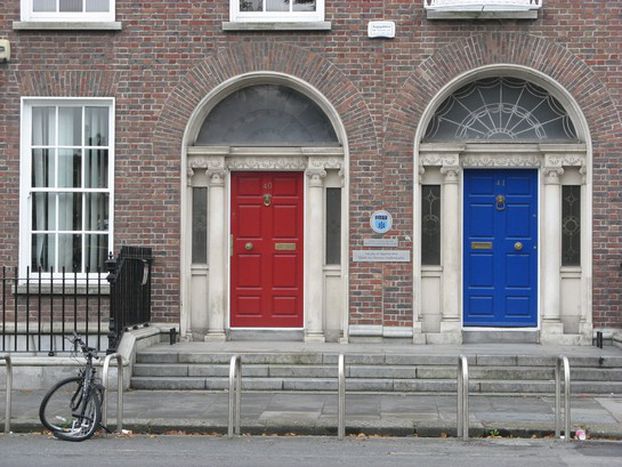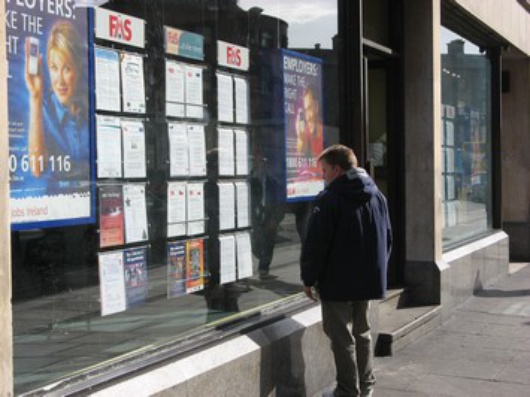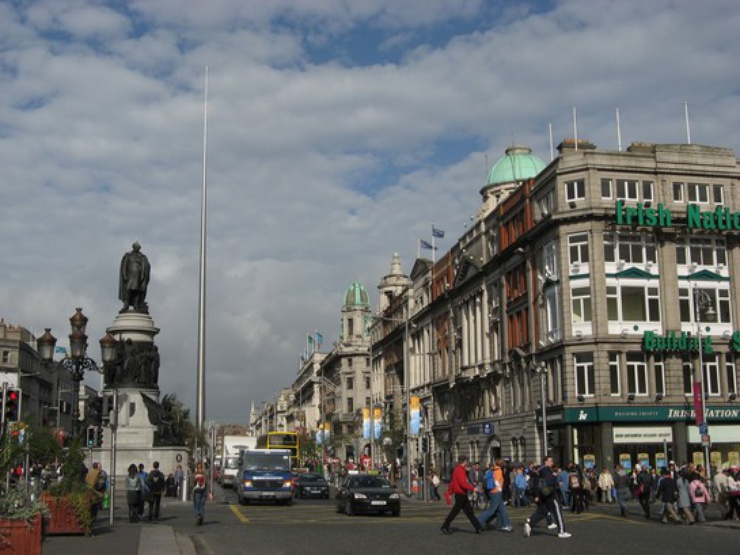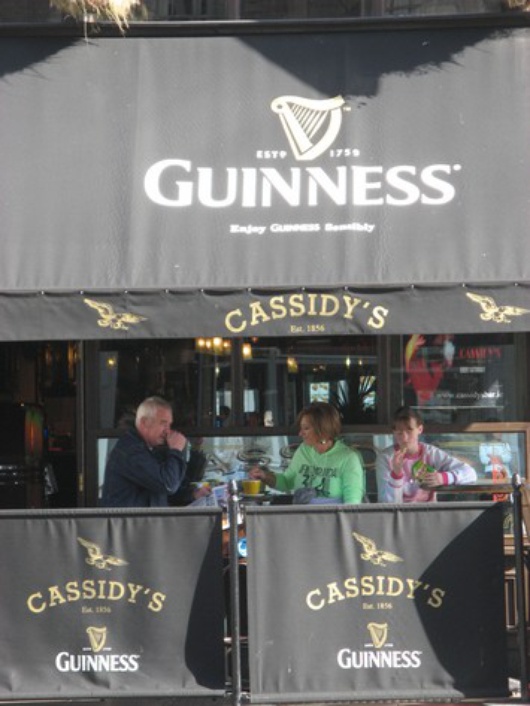
Ireland: doors wide open for foreign labour
Published on
More than 19, 000 people in Ireland lost their jobs in June 2008. If the downfall continues, more than a quarter of a million could be on the dole by Christmas. Lookback to how foreigners experienced employment growth in 2006
A man in his late thirties, clad in black, stops me as I walk down Grafton Street, a crowded shopping streets in the centre of Dublin. 'Which language do you speak? I can hear a flood of languages from passersby – Polish, Spanish, Italian. Irish has almost died away. Nowadays, English is also becoming lost,' he says, handing me a leaflet: God's way, not yours.
Finding God
 Ireland, a country with an extremely high catholic tradition, is known for its rapid economic growth thanks to an increasing number of jobs and a simplification of acquiring work permits. In 2006, the country of Guinness and whiskey's labour market experienced an exceptional employment growth: 144, 000 vacancies were registered by the Training and Employment Authority (FAS), the highest number since FAS was established in 1988. By the end of 2006, employment grew by 85, 500. Unemployment was down to 4.1%, the lowest in the last five years. Foreigners account for almost 11% of the labour force.
Ireland, a country with an extremely high catholic tradition, is known for its rapid economic growth thanks to an increasing number of jobs and a simplification of acquiring work permits. In 2006, the country of Guinness and whiskey's labour market experienced an exceptional employment growth: 144, 000 vacancies were registered by the Training and Employment Authority (FAS), the highest number since FAS was established in 1988. By the end of 2006, employment grew by 85, 500. Unemployment was down to 4.1%, the lowest in the last five years. Foreigners account for almost 11% of the labour force.
Foreigners share the same working regulations as their fellow Irish employees
Natives do not show any intolerance to the foreigners working in sectors which have become uninteresting for them, like construction, pubs, restaurants and retail. Foreigners share the same working regulations as their fellow Irish employees. The minimum wage is 8.65 euros per hour. An employee is not allowed to work for more than 48 hours per week, is entitled to two days off per week and a paid vacation of 1.6 days per month. Employing a foreigner also brings bigger risks - many choose to return home.
Hostel – best place to start
Looking for a job usually starts in one of numerous hostels in the Irish metropolis. Youth Hostel International is a gathering point for individuals who come to this corner of Europe from Brazil, Uruguay, Argentina, Australia, USA, Spain, France, Italy etc. Each has a different story, but shares the same goals – to learn or improve their English, get a job to cover any expenses and earn extra money for travel and fun.

It's helpful for insecure newcomers with undefined expectations; you can help in the kitchen or clean rooms to get free accommodation, for example. 'This part-time job can also be a very useful reference when applying for a real job,' 27-year old Eduardo explains. The Brazilian enjoyed serving breakfasts with the other porters, who became good friends. The dining room is in a former church, now decorated with flags from all over the world. The kitchen service is on an altar. Music chosen by the helpful morning staff sounds all over. 'We are all part of one big family,' adds Eduardo, who did not have any problems getting the relevant work documents; his father is Italian. Being a member of the EU opens doors wider.
Almost no employer replies to emails
''Sometimes it can be really difficult to get a job in Dublin, despite the enormous amount of vacancies on the internet,' continues Eduardo. Almost no employer replies to emails. The best way is to hand in your CV personally. Leave a good impression, and you are usually invited for an interview: 'The rules are sometimes hard to understand. Why is it important to have two interviews to be a waiter? Why is fluent English a necessity for cleaning?' After a couple of months job-hunting, Eduardo became a waiter in one of the popular pubs in the city centre. But the time for new shores came soon – he and his brother Pedro went for a new challenge and found jobs in London. They say they are in no rush to go back home for another couple of years.
Poles find bright futures
 Some get lucky in a single week. Others fall into despair, like Jakub, a 25-year-old architecture student from Poland, who job-hunted via agencies. 'I was open; they promised to contact me, but nobody did. One of the guys in front of me did not have any experience but got a job,' he describes. After spending most of his money after more than a month, he returned to Poland. However, a larger number of Polish immigrants work in Ireland as security guards, sales assistants, waiters and cleaners. They have opened their own shops, bakeries, restaurants, and even established media.
Some get lucky in a single week. Others fall into despair, like Jakub, a 25-year-old architecture student from Poland, who job-hunted via agencies. 'I was open; they promised to contact me, but nobody did. One of the guys in front of me did not have any experience but got a job,' he describes. After spending most of his money after more than a month, he returned to Poland. However, a larger number of Polish immigrants work in Ireland as security guards, sales assistants, waiters and cleaners. They have opened their own shops, bakeries, restaurants, and even established media.
Some families won't go back. 'When I was looking for a job, I could not speak a word of English. My boss wrote what she expected from me on a piece of paper and I used a dictionary,' says Dorota, a nurse, who worked as a cleaner in one of Dublin's prestigious shops. She has been living happily in the capital with her husband and son for a few years and says she will only return to Poland to visit.
Closing the doors?
After getting a residence permit, for which an electricity or a gas bill of a private residence or a hostel confirmation is enough, a foreigner can apply for a Personal Public Service (PPS) number. This helps to open a bank account, usually including internet and phone banking free of charge. Over 300, 000 PPS numbers have been issued to the migrants of the countries which joined the EU in 2004. Within a week, all documents are prepared and the quest for employment can begin. All free of charge. So simple and attractive. The question is, for how long; experts are forecasting the highest level of unemployment rate in Ireland for almost a decade. It is predicted to reach 5,5% by the end of 2008.
This is an abridged version of the original article written by the winner of the European Young Journalist of Slovenia 2008



